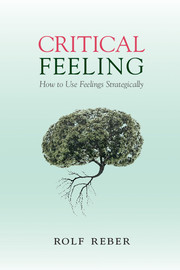Epilogue
Published online by Cambridge University Press: 05 March 2016
Summary
Building on critical thinking, I have developed the concept of critical feeling and reviewed some potential applications. This work lies at the intersection of philosophy, psychology, and education. I focused on psychology, which provides the empirical basis for interventions that make use of feelings in order to improve outcomes. As we have seen, there is already psychological research that informs critical feeling, but much more could be done.
In order to implement critical feeling, psychological research needs to be embedded in philosophical thought and implemented in educational practice. Insights from the philosophy of education, moral philosophy, theory of science, epistemology, and the philosophy of art provide us with the right questions for empirical research. Philosophy of education introduced the concept of critical thinking. Moral philosophy helped to anchor critical thinking in personal and communal values. This connection paved the way to establish a similar link between critical feeling and values. This conceptual work is important because research questions in psychology often derive from tacit assumptions and hidden values that must be made explicit. We have seen that clarifying the role of values behind a research question does not prevent scientists from doing value-free research. Beyond the distinction between value-free science and value-laden practice, theory of science needs to clarify the role of empirical psychology within the social sciences. Psychologists often like to see themselves as natural scientists, as the term psychological science testifies. That may be correct as long as they study basic processes. However, psychology as it is needed for critical feeling may be more akin to anthropology or sociology. There are anthropologies and sociologies of different cultures and classes. Likewise, we may develop psychologies of different groups by combining universal processes of perception, thought, and affect with various ecologies and historical contexts. The existing conceptual framework required for such integration is fragmentary at best. Epistemology asks questions to do with, for example, understanding the justification of feelings in certain situations. This perspective goes beyond existing psychological research about the interpretation of emotions and therefore opens new research questions. Answering these questions is crucial because critical feeling needs to be rooted in the understanding of one's own affective and metacognitive experiences. The philosophy of art teaches psychologists to go beyond measuring aesthetic preferences. A full picture of art appreciation requires that research examines the understanding of artworks as a prerequisite to their evaluation.
- Type
- Chapter
- Information
- Critical FeelingHow to Use Feelings Strategically, pp. 241 - 242Publisher: Cambridge University PressPrint publication year: 2016

